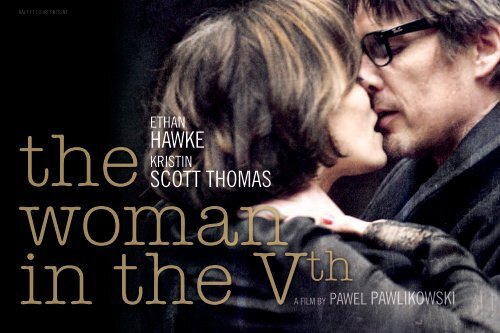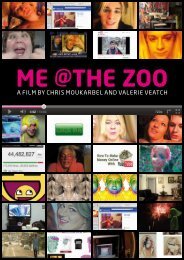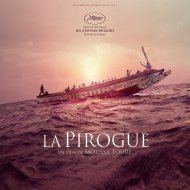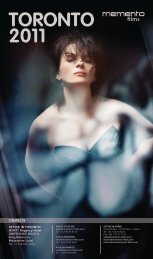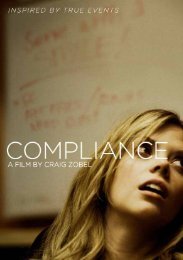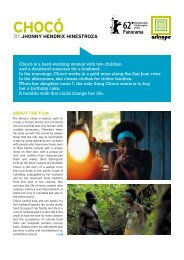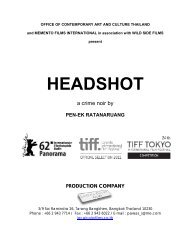Press Kit - Memento Films International
Press Kit - Memento Films International
Press Kit - Memento Films International
Create successful ePaper yourself
Turn your PDF publications into a flip-book with our unique Google optimized e-Paper software.
HAUT ET COURT PRESENT<br />
ETHAN<br />
HAWKE<br />
KRISTIN<br />
SCOTT THOMAS<br />
the<br />
woman<br />
in the V th<br />
A FILM BY PAWEL PAWLIKOWSKI
HAUT ET COURT PRESENT<br />
ETHAN HAWKE<br />
KRISTIN SCOTT THOMAS<br />
the woman in the V th<br />
CONTACTS<br />
PRODUCTION CONTACTS<br />
Haut et Court<br />
38 rue des Martyrs - 75009 Paris - France<br />
Tel: +33 1 55 31 27 27<br />
info@hautetcourt.com<br />
www.hautetcourt.com<br />
WORLD SALES & FESTIVAL<br />
<strong>Memento</strong> <strong>Films</strong> <strong>International</strong><br />
9 cité Paradis - 75010 Paris - France<br />
Tel: +33 1 53 34 90 20<br />
sales@memento-films.com<br />
www.memento-films.com<br />
Joanna KuLIG<br />
A FILM BY PAWEL PAWLIKOWSKI<br />
France/Poland/UK - 2011 - 83 min. - Color - 35 mm - 1 : 1.85 - Dolby SRD<br />
Samir Guesmi
SYNOPSIS<br />
American writer Tom Ricks comes to Paris desperate to put his life together again and<br />
win back the love of his estranged wife and daughter. When things don’t go according<br />
to plan, he ends up in a shady hotel in the suburbs, having to work as a night guard<br />
to make ends meet.<br />
Then Margit, a beautiful, mysterious stranger walks into his life and things start<br />
looking up. Their passionate and intense relationship triggers a string of inexplicable<br />
events… as if an obscure power was taking control of his life.
AGAINST THE GRAIN<br />
Interview with Pawel Pawlikowski and Ethan Hawke<br />
The production company’s offices, Rue des Martyrs in Paris. It’s springtime. Since Ethan<br />
Hawke is in New York, it’s been suggested that he talks to Pawel Pawlikowski via video link.<br />
In a few minutes, Ethan will be on the line... Meanwhile, Pawlikowski settles into in a quiet<br />
room. The open window gives onto a garden. It is agreed to begin the interview in French,<br />
but Pawlikowski’s gentle voice will soon switch to English.<br />
Douglas Kennedy’s novels are highly enjoyable thrillers to read. The heroes in them are<br />
often caught in a spiral that’s outside of their control. Yet THE WOMAN IN THE FIFTH doesn’t<br />
seem like the easiest to adapt for the big screen.<br />
PAWEL PAWLIKOWSKI: Yes, but I never really thought of it as an adaptation, more like a good<br />
starting point for a film that would have its own internal logic. If you look at it in a certain way<br />
the story could be a record of psychological disintegration: the story of a man who falls apart,<br />
becomes schizophrenic. I’ve been interested in this theme for a while. Before starting on THE<br />
WOMAN IN THE FIFTH I was writing a script, which dealt with this subject head on. In fact it<br />
was a little bit too head on… and too personal. Douglas’ book suggested a more oblique and<br />
interesting way of dealing with this theme.<br />
The book wasn’t necessarily close to my world, but I was tickled by the possibilities it<br />
suggested. I felt it could be an interesting adventure, especially as I had the confidence of the<br />
producers at Haut et Court - we really wanted to work together. So I said, what if we took the<br />
book and went against the grain a little?<br />
Let’s take the main elements of the novel, shuffle them around, add some new things and<br />
put it together again in a different way. So we don’t have this relatively innocent hero who<br />
stumbles through a hostile world, facing one problem after another, but a hero who himself<br />
is “the problem”.<br />
What is your approach to adaptation, in general?<br />
Pretty liberal. In MY SUMMER OF LOVE, I also started from a novel, but the film mutated into<br />
something quite different. For me, books are simply a starting point, like newspaper cuttings,<br />
or dreams, or situations from your past life. They give you the elements… some characters,<br />
a landscape, an interesting situation… But in the end the film has to find its own independent<br />
logic and find its own language. Staying close to the novel is usually bad news for a film…<br />
Here, I wanted to make Tom (Ethan Hawke) a complicated, conflicted and ambiguous hero…<br />
Tom is lost even before the film starts: his writing is going nowhere, it’s not sincere or<br />
inspired. Love too has gone wrong; for whatever reason his wife wants to have nothing to do<br />
with him anymore... So Tom projects his love - or rather his need for love - into his angelic<br />
6 year-old daughter, whom he hasn’t seen for 3 years… That’s quite a change from the novel.<br />
The language of the film is also very different. It’s less explicit, more allusive, the plotting is<br />
looser, things unfold with images and the reality is slippery and ambiguous. The film starts out<br />
more or less realistic but imperceptibly the boundaries of reality and dream start to dissolve.<br />
So in the end, is the film more your original screenplay than a literary adaptation?<br />
It is original. Although I wouldn’t say it’s entirely “mine”. Filmmaking is a collective and rather<br />
mysterious process, a journey which doesn’t all happen at the desk. I need a starting point,<br />
an overall idea, two or three characters with dramatic possibilities, ones who are paradoxical<br />
or conflicted. And then I write, I rewrite. I look for the actors, I find the locations, I take<br />
photographs, I work with the actors… Then I rewrite again with these faces and places in<br />
mind. Try things out on my producers or friends. At some stage my designer and director of<br />
photography get involved and I rewrite again. In a way this is analogous to literary creation,<br />
but it’s not literature. The process doesn’t happen on the page.<br />
Until THE WOMAN IN THE FIFTH my films were vaguely naturalistic. They may have been stylized<br />
and at times a bit surreal, but ultimately they fed off the real world, they followed a realistic<br />
psychology and had a clear narrative logic. In THE WOMAN IN THE FIFTH I went down a slightly<br />
different route.<br />
You’re flirting with the codes of genre movies.<br />
I’m not sure whether “flirting” is the right way to describe it. Horror or suspense films are shot<br />
in such a way that the viewer quickly soon realizes what the game is. THE WOMAN IN THE FIFTH<br />
doesn’t give you these any genre handles, doesn’t signal anything clearly, things become<br />
strange and scary quite imperceptibly… I tried to be as discreet as possible… In some ways<br />
THE WOMAN IN THE FIFTH is a new departure, but at the same time, it’s not so different from<br />
my other films: few carefully chosen locations, not too much plot, the situations and images<br />
are a little stylised but they feed off a concrete reality and a landscape. And there’s always one<br />
main character through whom we see the world.<br />
Here, this world is Paris. The Paris you film is indeed strange, but it feels very original and<br />
very true to life.<br />
I tend to use landscape as a mental space. I did that even in my documentaries. I’m not<br />
so much interested in the world as it is, or in paying homage to a particular place. I never<br />
wanted to show Paris, no more than I wanted to show the real Yorkshire, or the Kent coast<br />
in my earlier films. So I’m always really surprised when people come to me after seeing my<br />
films and tell me how much I really “got” these places, places they’ve known all their lives,<br />
but never saw properly shown on the screen.<br />
I use real locations but I strip them down and make them strange in a certain way. I’m always<br />
trying to get at something timeless, dream-like or nostalgic. The hero’s emotional state is the key.<br />
It’s through him that we see the world. I really like Paris. And to be honest, I don’t see it in<br />
real life the same way I show it in the film. Even when I was young, broke and out on a limb,<br />
Paris always seemed welcoming. But let’s face it, this film isn’t really about Paris.<br />
The problem with Paris is that it’s really difficult to find places where it doesn’t look like some<br />
cliché of itself. It’s hard… Wherever you look, you have these white or off-white, creamy buildings.<br />
The doorframes, the windows, the cafés, all so Parisian!... And it’s so lively and colourful<br />
everywhere. I spent a lot of time with my adventurous set designer Benoît Barouh,<br />
criss-crossing the city on his scooter, scouring it for something unusual, something that would<br />
ring a bell... I wanted a Paris that wasn’t really Paris. I needed some 1970s Eastern Europe!<br />
You have made a lot of documentaries, also very much in your own style. Do you ever want<br />
to return to that?<br />
I wouldn’t mind. But the world I was interested in has disappeared. And anyway I don’t think<br />
there’s much call these days for the sort of documentaries I used to make. For me documentary<br />
was never about explaining the world didactically, or just humbly recording it, but more about<br />
looking at the world against the grain, making it less obvious, more troubling, mysterious,<br />
distilling it in some way, through the right image, sound, editing… It takes lots of time,<br />
patience and effort to film the right situation, the right moment, something revealing,<br />
unique or beautiful, from the right angle, in the right light. These days, in an age of total<br />
communication, images are dozen to a penny and everything has to be spelt out, rammed<br />
down your neck. There are of course noble exceptions, documentary fanatics like Dvortevoi<br />
or Kossakovsky, but generally documentaries are aimed at the TV, or they have to lure large<br />
audiences into the cinema, so obviously they have to conform to certain rules or formats.<br />
Obliqueness, ambiguity, poetry are not much in demand these days.<br />
I remember Kieslowski telling me over a drink some thirty years ago: “Shoot each film as<br />
if it were your last. Or do something else!” This is what I tend to do. So here I am with<br />
THE WOMAN IN THE FIFTH, this strange hybrid creature I love.<br />
You’re Polish, you live in London, you’ve never really lived in Paris. Do you feel an affinity<br />
with this man for whom everything in the city is foreign, and who’s very alone?<br />
It’s a situation I’m familiar with. You arrive somewhere new and big, where you don’t know the<br />
rules of the game, the ins and outs of the language; one minute you feel cocky and triumphant,
AGAINST THE GRAIN<br />
next moment you’re lost and all at sea. You suspect people may be harbouring ill feelings,<br />
want to rip you off or plot against you. And you always bring your personal “baggage” with you.<br />
The Paris in our film is all about Tom’s state of mind. That colours everything we see.<br />
Did you try during the shoot to make him more sympathetic or likeable? Or to play with the<br />
idea that he would hide his hand, or even that he’s unaware of his actions?<br />
Absolutely. That was key. The audience had to feel engagement and sympathy with the hero,<br />
while slowly realizing that we can’t trust him, that there is something strange, possibly<br />
sinister about him. The technique is common in novels; between the lines we discover that<br />
the narrator is not telling the truth or that he is deluded. Since cinema is less “interior” than<br />
literature - everything is shown -, this procedure is a bit of a challenge. I’ve never seen this<br />
kind of thing done in a film before.<br />
The difficult thing was how to do this incrementally, how to avoid having a “key moment”<br />
when the audience discovers that the hero is not who they thought he way. It was a bit of a<br />
tightrope act. An audience is made up of individuals, who all very different, imagine the world<br />
differently, come with a different baggage. I like the idea of film as a kind of distorting mirror<br />
in which everyone discovers things - and themselves - in their own way and in their own time.<br />
It’s interesting in at which point will this or that person stop identifying with the hero and say<br />
to themselves: “Hang on, there’s something not quite right about this guy!”<br />
What’s more, my ambition was to have it both ways, to make the audience start wondering<br />
about the hero, but at the same time to make them stay engaged with him right to the end.<br />
And hopefully to suffer when he goes under. Ethan is perfect for what I had in mind there. He<br />
exudes openness, warmth, generosity and despite his 40 years, he hasn’t lost his adolescent<br />
candour. You trust him, you go with him. What’s more, he’s got a sharp mind and a way with<br />
words. There’s always something going on behind his blue eyes. It’s difficult to play a writer if<br />
you don’t really have an intellect. Ethan actually is a writer. He’s on his third novel now. Getting<br />
Ethan involved was crucial. Warmth, intellect, intensity, a certain romantic idealism - you can<br />
never play these qualities convincingly, if you don’t have them.. (laughs)<br />
We now move over to a computer screen. The delighted face of Ethan Hawke appears. He cannot<br />
yet see Pawel. Their complicity clearly didn’t end with the shoot: Hawke enthusiastically tells<br />
Pawlikowski about the dream he had the night before: they were both working on a big-budget<br />
epic in Russia. “It’s a deal!” Pawel replies. “Just have to find the right oligarch!”<br />
So how did you both meet?<br />
PAWEL: …Do you remember, Ethan?<br />
ETHAN: You came to London, I was on stage at the Old Vic. I didn’t even know who you<br />
were! My on-stage partner was Rebecca Hall. I told her your name and her eyes widened:<br />
“He’s the hottest director right now!” I said to myself: “Shit! I’d better watch his films!”<br />
We met in another theatre, the Royal Court. I was appearing in two plays, one by Chekhov and<br />
Shakespeare’s “A Winter’s Tale”. Pawel didn’t like the Chekhov production much, so he came<br />
to see me after the Shakespeare. By now I’d seen most of his films and I wanted to work with<br />
him. We met again in New York and with each meeting, we took it forward. I really played a part<br />
in creating it, and it ended up becoming one of my favourite roles.<br />
What was you first impression of your character?<br />
ETHAN: To be completely honest, neither Pawel nor I had any preconceived ideas about<br />
Tom. It was something about the mood of the piece that appealed to me. At several points<br />
I wondered about Tom’s true personality. It all gradually fell into place. Pawel and I had some<br />
long conversations about the script and the film ahead of the shoot. We exchanged ideas,<br />
we discovered who he is. But in the beginning, I wasn’t sure about anything.
AGAINST THE GRAIN<br />
PAWEL: You asked me at our first meeting why I wanted to make this film. And I answered,<br />
because the hero is wonderfully messed up, it’s the story of a breakdown. Could be beautiful.<br />
A tragic swansong. That’s not in the novel, but it could really work. That’s when Ethan perked<br />
up. He could relate to that. A film about depression, schizophrenia and suicide! Irresistible.<br />
(They laugh)<br />
ETHAN: And for me, the film deals with the torment surrounding one’s desire to be the father<br />
you always dreamt of being. That’s something I’m interested in. Everyone has their own idea<br />
of what it means to be an ideal parent. But you also have to juggle with the constraints of<br />
everyday life. That’s a subject I’m interested in at this moment of my life.<br />
Pawel, do you relate to this more intimate aspect of the story?<br />
PAWEL: Totally. This conflict between love, work, ego… Wanting incompatible things, not being<br />
able to chose or compromise, being torn apart… we can all relate to that.<br />
ETHAN: Our mutual trust gave us a great deal of freedom. Pawel works on instinct; if he<br />
doesn’t like something, he doesn’t like it, period. And he says so. When he watched the rushes<br />
of the first day’s filming, he sent me an email. I knew that after all our research around the<br />
character, he felt we’d arrived at something spot-on. Pawel doesn’t lie. If it wasn’t working,<br />
he’d have said so. We’d have been in quite a mess! But in the event, I was very confident.<br />
The character became richer every day after that.<br />
Did you feel like you were moving through a labyrinth?<br />
ETHAN: I really like that word, “labyrinth”... That fits perfectly. I hadn’t thought of it. This character is<br />
caught in a maze; he takes one path, finds it’s a dead end, then looks for the way out without being<br />
sure which way he came in. This film will speak to anyone who, at some point in their life, has<br />
felt they’re in that situation.<br />
Were you aware of trying to keep the audience on your side? There’s always a lingering<br />
doubt, a mystery about what you say and what you do.<br />
ETHAN: In cinema, the actor is what is beautiful, but it’s also about what the film, the editing,<br />
and the image does with him. True, Tom remains likeable. If you build in too many shady areas,<br />
you discredit him. That’s part of the construction of the character and of this film. But like<br />
everyone, I am serving Pawel’s vision of things. He was the one who shaped these characters.<br />
The madness comes through from time to time, when it’s the right moment. But not too often.<br />
The love too, at the right moment. And the humour. We shift from one register to another.<br />
In cinema, the actor doesn’t construct his character on his own. You have to put your faith<br />
in others to create it with you. You offer your palette, that’s all.<br />
But playing this kind of character is an internal experience. The actor and the directing<br />
become one. In cinema, the camera often captures the actor just as he performs. In this film,<br />
everything is seen from Tom’s point of view. His point of view and the camera’s merge into one.<br />
I realized the kind of film Pawel wanted to make and that I had to enter into it, so that our<br />
approaches became one and the same.<br />
Had you ever worked like that before?<br />
ETHAN: Never! But we made a great team and I felt like I was discovering the film at the<br />
same time as Pawel. There’s something in this story, and even in the novel, which is unsaid.<br />
And which spoke to us. The film has its backbone: that’s the character of Margit. Her personality<br />
is always very clear: it’s “sex, death, ghost, life, mother”. That makes her very stimulating for<br />
the others. You could build things around that.<br />
PAWEL: Yes, she is a presence throughout. A sort of magnet. Her character may be quite<br />
enigmatic, but her function in the story is pretty clear.
AGAINST THE GRAIN<br />
ETHAN: For me, certain actors embody the very essence of cinema. Kristin Scott Thomas has<br />
that quality. She has an incredible presence, she’s a fantastic actress. She has that strange<br />
sensuality, that natural elegance. It’s an experience to act with someone like that. With her,<br />
everything seems easy. With others, you have to work really hard to get there. They need<br />
exceptional lighting, an exceptional text. Her character is above all symbolic: a lot of actors<br />
aren’t up to that.<br />
PAWEL: Yes, Margit is a mystery wrapped up in an enigma, without a clear backstory - even<br />
her nationality is uncertain. For an actor, that’s complicated, but Kristin was great, fearless.<br />
I approached her with some trepidation at first. I’d heard that she was very demanding of<br />
her directors, but I found her fantastic to work with, a real luxury, very courageous and open,<br />
and at the same time very precise. She gave me everything I needed and more. She has great<br />
elegance in her working relationships.<br />
I like the scene when she talks about her roots. It’s already a bit off-key and bizarre, but<br />
Kristin does that with a naturalness that makes you totally believe in it!<br />
PAWEL: Ryszard and I have a very strong understanding, we’re pretty much in tune,<br />
almost symbiotic at times.<br />
Ryszard is an old fox who knows all the tricks and short cuts, but he’s never lost his childlike<br />
excitement, a sense of adventure, inventiveness. We’re good together. He’s like me, a bit lazy,<br />
he doesn’t do too many films; he doesn’t get out of bed unless he’s really excited by a<br />
project. I work with him in the same way I work with a good actor. Each scene is a little<br />
dance, a give and take.<br />
ETHAN: Yes. And that gives the film a presence, a visual power. Every scene is the tip of<br />
an iceberg.<br />
PAWEL: What I wanted was to steer clear of both naturalist drama and genre and come up<br />
with something original… I wanted to open up a certain space and draw in the audience;<br />
hypnotise them in a way, so they slowly forget their expectations, the usual questions, and let<br />
themselves go on this mysterious journey… and hopefully recognise something of themselves<br />
in the process.<br />
PAWEL: I didn’t want to give too much information. It’s also a question of rhythm. I like the idea<br />
that each scene has to have a musical rhythm. It’s not simply a matter of the meaning of the<br />
words. It’s about tempo, you have to find a certain swing. That’s part of cinema for me: a sense<br />
of rhythm. Joanna Kulig, the Polish actress who plays Ania, has a lot of that too.<br />
ETHAN: Yes, she understood exactly what you wanted when you talked to her about music.<br />
You asked her to act at a certain moment like a mazurka! Pawel knows how to find a rhythm,<br />
a little filmic melody, without moving his camera. I watched his crew at work, especially<br />
Ryszard Lenczewski, his director of photography: they were like an orchestra. Like an old-school<br />
rock band, where the words alone aren’t the most important thing. There’s the bass, the drums,<br />
lots of things going on. Right on the beat, as you said.<br />
interview by Harold Manning
PAWEL PAWLIKOWSKI<br />
ETHAN HAWKE<br />
Born in 1957 in Warsaw, Pawel Pawlikowski left Poland at 14, moved to London, Germany, Italy<br />
and finally settled in Great Britain.<br />
After studying literature and philosophy, he started his career directing documentaries, which<br />
are crowned by many prestigious awards. His transition to fiction came with medium-length<br />
film “Twockers” in 1998.<br />
His debut theatrical feature film, LAST RESORT, earned international critical acclaim and<br />
remarkable receptions at numerous festivals. It was awarded a BAFTA for Most Promising<br />
Newcomer.<br />
His next film, MY SUMMER OF LOVE, won a BAFTA for Outstanding British Film of the Year,<br />
amongst a string of prestigious prizes.<br />
Between 2004 and 2007, Pawel Pawlikowski was a Creative Arts Fellow at Oxford Brookes<br />
University. He is fluent in six languages: his native Polish, as well as French, English, German,<br />
Italian and Russian.<br />
THE WOMAN IN THE FIFTH is his third feature film. Its worldwide premiere will be presented in<br />
Toronto Film Festival 2011.<br />
Filmography<br />
Feature <strong>Films</strong><br />
2000 - LAST RESORT<br />
2004 - MY SUMMER OF LOVE<br />
2011 - THE WOMAN IN THE FIFTH<br />
Selected Documentaries<br />
1989 - Vaclav Havel<br />
1991 - From Moscow to Pietushki<br />
1992 - Serbian Epics<br />
- Dostoevsky’s Travels<br />
1994 - Tripping with Zhirinovsky<br />
1998 - Charlie Chaplin and the Cossack Gold<br />
Screenwriter, film director, theater director, and novelist. He has starred in over 30 films,<br />
including DEAD POETS SOCIETY, BEFORE SUNRISE, BEFORE SUNSET, REALITY BITES,<br />
GATTACA, GREAT EXPECTATIONS, HAMLET, TRAINING DAY, BEFORE THE DEVIL KNOWS YOUR<br />
DEAD, and BROOKLYN’S FINEST. He has been nominated for an Academy Award as both an<br />
actor (TRAINING DAY) and a screenwriter (BEFORE SUNSET).<br />
On stage he has performed in numerous off Broadway productions earning him an Obie<br />
Award (for his work in the 2011 production of Blood from a Stone), Lucille Lortel, Drama<br />
Desk and Drama League nominations over the years. On Broadway, he starred in Lincoln<br />
Center’s The Coast of Utopia for which he was nominated for a Tony Award. He also starred<br />
in Jack O’Brien’s production of Shakespeare’s Henry IV, which won the Tony for best revival.<br />
Recently he has directed two plays for The New Group - Jonathan Marc Sherman’s Things<br />
We Want and Sam Shepard’s A Lie of the Mind earning him a Drama Desk for Outstanding<br />
Direction in a play as well as recognition in the New York Times and The New Yorker for<br />
top ten leading theater productions in 2010. He has directed two films - CHELSEA WALLS,<br />
which premiered at the Cannes Film Festival and THE HOTTEST STATE, which premiered at<br />
the Venice Film Festival. He has written two novels, The Hottest State and Ash Wednesday.<br />
Filmography<br />
1985 - EXPLORERS by Joe Dante<br />
1989 - DEAD POETS SOCIETY by Peter Weir<br />
- DAD by Gary David Goldberg<br />
1991 - MYSTERY DATE by Jonathan Wacks<br />
- WHITE FANG by Randal Kleiser<br />
1992 - A MIDNIGHT CLEAR by Keith Gordon<br />
- WATERLAND by Stephen Gyllenhaal<br />
1993 - RICH IN LOVE by Bruce Beresford<br />
- ALIVE by Frank Marshall<br />
1994 - FLOUNDERING by Peter McCarthy<br />
1995 - QUIZ SHOW by Robert Redford<br />
- REALITY BITES by Ben Stiller<br />
- BEFORE SUNRISE by Richard Linklater<br />
- SEARCH AND DESTROY by David Salle<br />
1998 - GATTACA by Andrew Niccol<br />
- GREAT EXPECTATIONS by Alfonso Cuaron<br />
- THE VELOCITY OF GARY by Dan Ireland<br />
- THE NEWTON BOYS by Richard Linklater<br />
1999 - JOE THE KING by Frank Whaley<br />
2000 - SNOW FALLING ON CEDARS by Scott Hicks<br />
- TELL ME by Julie Delpy<br />
2001 - TAPE by Richard Linklater<br />
- WAKING LIFE by Richard Linklater<br />
- THE JIMMY SHOW by Frank Whaley<br />
- TRAINING DAY by Antoine Fuqua<br />
2004 - BILLY DEAD by Keith Gordon<br />
- TAKING LIVES by D.J. Caruso<br />
2005 - BEFORE SUNSET by Richard Linklater<br />
- ASSAULT ON PRECINCT 13 by Jean-François Richet<br />
2006 - LORD OF WAR by Andrew Niccol<br />
- FAST FOOD NATION by Richard Linklater<br />
2007 - BEFORE THE DEVIL KNOWS YOU’RE DEAD by Sydney Lumet<br />
2008 - CHELSEA ON THE ROCKS by Abel Ferrara<br />
- WHAT DOESN’T KILL YOU by Brian Goodman<br />
2009 - LITTLE NEW YORK by James DeMonaco<br />
2010 - NEW YORK I LOVE YOU<br />
- DAYBREAKERS by Michael and Peter Spierig<br />
- BROOKLYN’S FINEST by Antoine Fuqua<br />
- MOBY DICK<br />
- THE WOMAN IN THE FIFTH by Pawel Pawlikowski
KRISTIN SCOTT THOMAS<br />
Award winning actress Kristin Scott Thomas has become internationally renowned for her<br />
talent, elegance and commitment to her craft. Never shying away from challenging roles and<br />
determined not to repeat herself, Scott Thomas’ body of work is an extraordinary collection of<br />
acclaimed film, television and theatre performances.<br />
Scott Thomas received a Cesar Award nomination for her performance in Gilles Paque Brenner’s<br />
SARAH’S KEY. She is also recently seen in Alain Corneau’s CRIME D’AMOUR. Upcoming, she will<br />
appear in Declan Donnellan and Nick Ormerod’s BEL AMI; Lasse Halstrom’s SALMON FISHING<br />
IN THE YEMEN; SOUS TON EMPRISE, Alain Corneau’s UNE FEMME PARFAITE and DANS LA<br />
MAISON. In 2010, Scott Thomas co-starred in Sam Taylor Wood’s directorial debut, NOWHERE<br />
BOY. For her performance, she received a “Best Supporting Actress” British Academy of Film<br />
and Television Arts Award nomination and a British Film Independent Award nomination. Also<br />
last year, Scott Thomas was seen is in Catherine Corsini’s PARTIR. For her performance, Scott<br />
Thomas received a “Best Actress” a Cesar Award nomination.<br />
In 2001, Scott Thomas was part of the ensemble for Robert Altman’s acclaimed, Oscar winning<br />
film, GOSFORD PARK.<br />
Scott Thomas first won over audiences and critics worldwide with her Academy-award<br />
nominated performance in the late Anthony Minghella’s THE ENGLISH PATIENT, where she<br />
starred opposite Ralph Fiennes and Juliette Binoche. For her performance she was honored by<br />
the National Board of Review, and was nominated for Golden Globe, the BAFTA, and the Screen<br />
Actors Guild Award.<br />
Making her U.S. film debut in Prince’s UNDER THE CHERRY MOON, Scott Thomas went on to<br />
great acclaim in Mike Newell’s FOUR WEDDINGS AND A FUNERAL, where she won a BAFTA<br />
award for Best Supporting Actress. Other notable credits include: Philip Haas’ ANGELS AND<br />
INSECTS; Richard Loncraine’s RICHARD III; Brian DePalma’s MISSION IMPOSSIBLE; Robert<br />
Redford’s THE HORSE WHISPERER; Sydney Pollack’s RANDOM HEARTS; Irwin Winkler’s LIFE AS A<br />
HOUSE; Roman Polanski’s BITTER MOON; Paul Schrader’s THE WALKER and Justin Chadwick’s<br />
THE OTHER BOLEYN GIRL, EASY VIRTUE, and CONFESSIONS OF A SHOPAHOLIC.<br />
Filmography<br />
1985 - UNDER THE CHERRY MOON by Prince<br />
1987 - THE MAN WHO LOVED ZOOS by Jean-Pierre Mocky<br />
- LOUNGE CHAIR by Jean-François Amiguet<br />
- A HANDFUL OF DUST by Charles Sturridge<br />
1988 - UNCONTROLLABLE CIRCUMSTANCES by Pierre Jolivet<br />
1988 - HEADSTRONG by Carlo Cotti<br />
1989 - THE GOVERNOR’S PARTY by Marie-France Pisier<br />
- THE BACHELOR by R. Faenza<br />
1990 - IN THE EYES OF THE WORLD by Eric Rochant<br />
1991 - BITTER MOON by Roman Polanski<br />
1993 - FOUR WEDDINGS AND A FUNERAL by Mike Newel<br />
- AN UNFORGETTABLE SUMMER by Lucian Pintilie<br />
1994 - THE CONFESSIONAL by Robert Lepage<br />
- ANGELS AND INSECTS by Philip Haas<br />
- THE POMPATUS OF LOVE by Richard Schenkman<br />
1995 - MISSION : IMPOSSIBLE by Brian de Palma<br />
- THE ENGLISH PATIENT by Anthony Minghella<br />
- RICHARD III by Richard Loncraine<br />
1996 - LOVE AND CONFUSIONS by Patrick Braoudé<br />
- THE REVENGERS’ COMEDIES by Malcolm Mowbray<br />
1997 - THE HORSE WHISPERER by Robert Redford<br />
1998 - UP AT THE VILLA by Philip Haas<br />
1999 - RANDOM HEARTS by Sydney Pollack<br />
2002 - SMALL CUTS by Pascal Bonitzer<br />
2003 - ARSENE LUPIN by Jean-Paul Salomé<br />
2004 - MAN TO MAN by Régis Wargnier<br />
2005 - THE VALET by Francis Veber<br />
- TELL NO ONE by Guillaume Canet<br />
2007 - 2 ALONE IN PARIS by Eric Judor and Ramzy Bedia<br />
- LARGO WINCH by Jérôme Salle<br />
2008 - LEAVING by Catherine Corsini<br />
- I’VE LOVED YOU SO LONG by Philippe Claudel<br />
2009 - IN YOUR HANDS by Lola Doillon<br />
- NOWHERE BOY by Sam Taylor-Wood<br />
- LOVE CRIME by Alain Corneau<br />
- SARAH’S KEY by Gilles Paquet Brenner<br />
2010 - THE WOMAN IN THE FIFTH by Pawel Pawlikowski<br />
- BEL AMI by Dunkan Donnellan<br />
- SALMON FISHING in the YEMEN by Lasse Hallström
CAST<br />
CREW<br />
ETHAN HAWKE<br />
KRISTIN SCOTT THOMAS<br />
JOANNA KULIG<br />
SAMIR GUESMI<br />
DELPHINE CHUILLOT<br />
JULIE PAPILLON<br />
GEOFFREY CAREY<br />
MAMADOU MINTÉ<br />
MOHAMED AROUSSI<br />
JEAN-LOUIS CASSARINO<br />
JUDITH BURNETT<br />
MARCELA IACUB<br />
WILFRED BENAÎCHE<br />
PIERRE MARCOUX<br />
ROSINE FAVEY<br />
ANNE BENOIT<br />
GREGORY GADEBOIS<br />
Tom<br />
Margit<br />
Ania<br />
Sezer<br />
Nathalie<br />
Chloé<br />
Laurent<br />
Omar<br />
Moussa<br />
Dumont<br />
Lorraine Lherbert<br />
Isabella<br />
Lieutenand Coutard<br />
Lawyer<br />
Lawyer’s translator<br />
Teacher<br />
Juvenile Protection Lt.<br />
Director<br />
Screenplay<br />
based on the novel by<br />
DOP<br />
Production Designer<br />
Editor<br />
Original Music<br />
1st AD<br />
Costume Designers<br />
Casting Directors<br />
Sound Mixer<br />
Sound Re-recording Mixer<br />
Sound Editor<br />
Dialogue Editor<br />
Production Manager<br />
Postproduction Supervisor<br />
Produced by<br />
Executive Producer<br />
Associate Producer<br />
Line Producer<br />
Co-producers<br />
Pawel Pawlikowski<br />
Pawel Pawlikowski<br />
Douglas Kennedy<br />
Ryszard Lenczewski<br />
Benoit Barouh<br />
David Charap<br />
Max de Wardener<br />
Sylvie Peyre<br />
Julian Day, Shaida Day<br />
Stéphane Batut, Alexandre Nazarian<br />
Nicolas Cantin<br />
Jean Pierre Laforce<br />
Valérie Deloof<br />
Agnès Ravez<br />
Sybille Nicolas-Wallon<br />
Christina Crassaris<br />
Caroline Benjo, Carole Scotta<br />
Tessa Ross<br />
Simon Arnal<br />
Barbara Letellier<br />
Piotr Reisch, Soledad Gatti-Pascual<br />
A co-production Haut et Court - Film4 - SPI <strong>International</strong> Poland - The Bureau In association with UK Film Council With the participation of Canal + - Orange Cinéma Séries -<br />
Haut et Court Distribution - Artificial Eye In association with <strong>Memento</strong> <strong>Films</strong> <strong>International</strong> - Coficup-Back Up <strong>Films</strong> - La Banque Postale Image 4 - Soficinéma 6 -<br />
Polish Film Institute With the support of I2I Audiovisuel - a MEDIA program of the European Union Developed with the support of Cofinova 2.<br />
Photos © Jean-Claude Lother
© Haut et Court - Film4 - UK Film Council - SPI <strong>International</strong> Poland.


